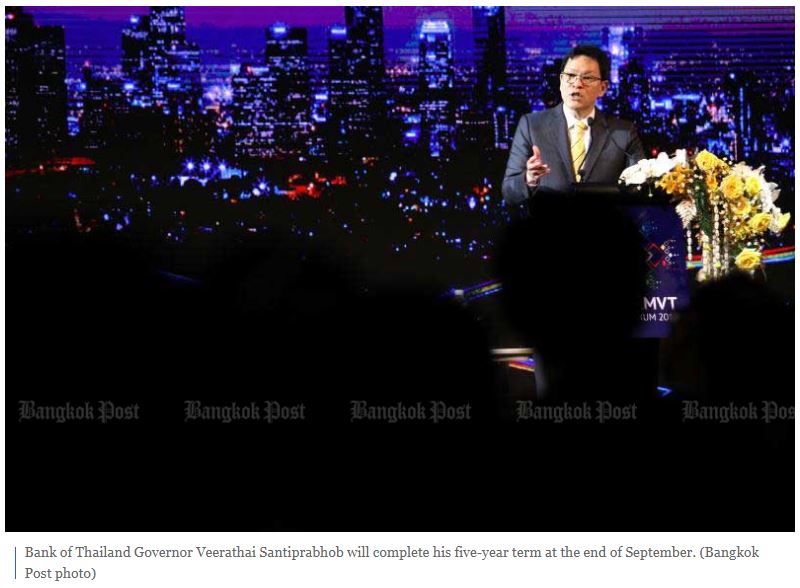Thailand: Next central bank governor faces crisis with near-zero rate
Thailand is searching for a new central bank governor to steer the economy through one of its biggest crises in decades as traditional policy options run out.
Bank of Thailand Governor Veerathai Santiprabhob, 50, will leave the bank once he finishes his five-year term at the end of September, declining to stay on longer because of family reasons. A selection committee received four applications for the job, including from two current deputy governors, according to local media reports. A shortlist will be sent to Finance Minister Uttama Savanayana by July 2.
The coronavirus pandemic has devastated two of Thailand’s key economic pillars, tourism and trade, putting the nation on course for its biggest contraction since the Asian financial crisis more than two decades ago. For the BoT, the slump is particularly challenging: conventional monetary policy space is quickly running out as interest rates fall to zero, and the next governor may need to adopt more non-traditional measures to spur the recovery.
“The incoming head of the central bank will inherit a challenging economic backdrop and rates already at record lows,” said Radhika Rao, an economist at DBS Group Holdings in Singapore. “Depending on his/her policy leaning, the Bank of Thailand might face pressure to seek unconventional modes to provide liquidity relief and lower borrowing costs.”
Here are some of the candidates that have applied for the post, according to local media reports. The BoT has declined to comment on the names.
Mathee Supapongse
He is currently deputy governor overseeing monetary stability and also sits on the Monetary Policy Committee. He holds a Master’s degree in economics from Williams College in the United States and had worked in the monetary policy arena at the central bank for more than 30 years.
Ronadol Numnonda
Also a deputy governor, he holds a Master’s degree in finance, investment and banking from the University of Wisconsin-Madison. His career at the central bank has been mostly in banking supervision, and he now oversees financial institutions stability
Tongjai Thanachanan
The only woman applicant, she has a decade of experience at the Boston Consulting Group and now leads Pracharath Rak Samakkee, a social enterprise providing advisory support to local community groups. She has a Master’s degree from the Kellogg School of Management
The BoT has already cut its benchmark interest rate three times this year, taking it to a fresh record low of 0.5%. A majority of economists surveyed by Bloomberg see no change in the rate on Wednesday.
Unconventional policy
Mr Veerathai — who will have two more scheduled rate meetings to oversee after this week — has already taken decisive steps to stabilise financial markets. In recent months, the central bank set up facilities to support the corporate bond market and provided cheap funds to banks to lend to small businesses.
Officials have said they are studying a number of unconventional policy options, like large-scale asset purchases and some form of yield-curve control, tools widely used in developed economies like Japan. The economic crisis has already prompted several emerging markets, including Indonesia, to experiment with new policy measures.
The incoming governor will also have to navigate financial-market risks, such as a surging currency. After an initial emerging-market sell-off when the coronavirus first began spreading, the baht has since rebounded in recent months as portfolio inflows returned. It’s up 5% against the dollar in the past three months, one of the biggest gainers in Asia.
Inflation target
The BoT has expressed concerns about the baht’s recent and rapid appreciation and said it’s ready to take steps to curb a climb that could imperil the fragile economy.
One goal that Veerathai leaves unfulfilled is achieving the inflation target. In his five years in office, the central bank has failed to consistently meet its 1%-4% price goal, except for 2018. The target is now 1%-3%.
“This low inflation environment is partly explained by the development of energy prices but it was also because of the limited traditional monetary policy space not allowing for more policy accommodation despite slowing growth,” said Charnon Boonnuch, economist at Nomura Holdings in Singapore.
The priority of the incoming governor should be to ensure a smooth transition and avoid any sudden change in the policy direction, he said. The policy stance “needs to remain firmly focused on supporting the economic recovery as well as to bring inflation back to within the target,” he said.
Monetary policy aside, a new governor will also need to focus on financial stability, said Pakorn Peetathawatchai, president of the Stock Exchange of Thailand.
“Close collaboration with commercial banks and related agencies will be important,” he said. “This will be needed to deal with new emerging types of risk and support real and financial industries’ needs that are more intertwined in many markets.”
Source: https://www.bangkokpost.com/business/1939560/next-central-bank-governor-faces-crisis-with-near-zero-rate


 Thailand
Thailand




